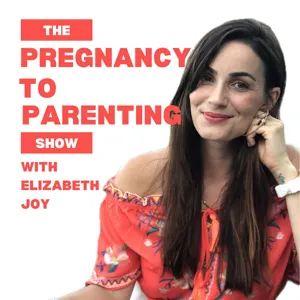Podcast Summary
The Transition to Motherhood: Understanding Matrescence: Matrescence is a significant identity shift for new mothers, impacting body, emotions, and social connections. Embrace the changes, manage expectations, seek support, and prioritize self-care.
Becoming a mother involves a significant shift in identity, a process called matrescence. This transition, which can be both joyful and challenging, impacts various aspects of a woman's life, including her body, emotions, and social connections. Matrescence, like adolescence, is a time of profound growth, but it can also be difficult and disruptive. Many new mothers may feel overwhelmed, uncertain, or even disconnected from themselves. It's essential to recognize that these feelings are normal and part of the process. To navigate this period, it's crucial to manage unrealistic expectations, seek support, and prioritize self-care. By understanding matrescence and embracing the changes it brings, new mothers can better prepare themselves for the unique challenges and rewards of motherhood. Additionally, remember that hosting a celebratory brunch for less is possible with wallet-friendly finds from Whole Foods Market. Enjoy a delicious and memorable brunch with cold smoked Atlantic salmon, mini quiches, organic everything bagels, and more, while also treating yourself to a beautiful bouquet of sourced for good flowers.
Understanding the Transition into Motherhood: Matrescence: Matrescence recognizes the complex experiences of motherhood as a normal process, shaped by individual factors, and can impact mental and physical health outcomes. Acknowledging this can promote compassion and understanding during this challenging time, especially for marginalized communities.
The concept of matrescence, a term coined in the 1970s to describe the transition into motherhood, provides an explanation for the complex and deep experiences that mothers go through. This recognition of the normalcy of the matrescence process can help mothers let go of expectations and find patience and compassion during this challenging time. Additionally, the experience of matrescence is shaped by individual factors such as race, culture, gender, and life experience, and can have significant impacts on mental and physical health outcomes. It's important to acknowledge and address the unique challenges faced by marginalized communities, particularly women of color, who are at greater risk of experiencing perinatal mood and anxiety disorders. Overall, understanding matrescence can empower mothers and promote a more compassionate conversation around childbirth and motherhood.
New mothers should prioritize mental health: New mothers should prioritize mental health, reflect on past experiences, avoid comparisons, practice self-care, and seek help if needed for postpartum mood and anxiety disorders.
It's important for new mothers to prioritize their mental health and seek help if they suspect they may be experiencing postpartum mood and anxiety disorders (PMADs). PMADs can develop after the initial "baby blues" period, which lasts up to 2-3 weeks postpartum. PMADs can impact a mother's mood and overall well-being, and it's crucial to address them with professional intervention and support. Additionally, our childhood experiences can influence how we approach motherhood. Reflecting on our past and considering what we want to replicate and what we want to change can help us own our unique parenting journey. Comparing ourselves to others, especially on social media, can be detrimental, so it's essential to keep things in perspective and remember that everyone's experiences are different. Lastly, practicing self-care and releasing the "shoulds" we put on ourselves can help reduce stress and improve overall well-being. For more resources and support, check out the Postpartum Support International website or listen to Life Kit's episode on coping with postpartum depression. Remember, it's okay to ask for help and prioritize your mental health as a new mother.
Define family goals and values with a mission statement and support squad: Creating a family mission statement and building a support squad can help new mothers navigate challenges, prioritize self-care, and establish a strong foundation for balanced family life.
Setting up a family mission statement and building a support squad can help women navigate the challenges of motherhood. By defining family goals and values, and having open conversations with partners about expectations and needs, families can establish a strong foundation. Additionally, identifying and reaching out to trusted individuals for emotional and practical support can alleviate feelings of isolation and help new mothers prioritize self-care. Even if these steps are taken after the baby's arrival, it's never too late to make a change. Prioritizing communication, support, and self-care can lead to a more fulfilling and balanced family life.
Reconnecting with your body and mind after giving birth: Practice gentle exercise and self-care, prioritize mindfulness and relaxation for improved physical and mental health postpartum.
Taking care of your physical and mental health during the postpartum period is essential for both your well-being and your child's development. After giving birth, your body undergoes significant changes, and healing can take time. Reconnecting with your body through gentle exercise and self-care activities can help boost your mood and confidence. Additionally, prioritizing moments for mindfulness and relaxation can help reduce stress and improve overall mental health. Remember, self-care is not a luxury, but a necessity for being the best parent you can be.
Self-care, community, and storytelling for new mothers: New mothers need daily self-reflection, community connections, and storytelling to navigate the emotional rollercoaster of motherhood. Find mom friends through various means and share maternal mental health stories to spread awareness and normalize complex emotions.
Self-care and community are essential for new mothers navigating the emotional rollercoaster of motherhood. Nicole recommends taking daily time for reflection and introspection to manage thoughts and feelings. Priya emphasizes the importance of connecting with other moms to combat feelings of isolation and normalize the complex emotions of motherhood. These connections do not replace old friendships but provide support during this unique season of life. Finding mom friends can be done through various means, including meetups, Facebook groups, community centers, and social networking apps. Remember, it's okay to put yourself out there and take the time to find people you resonate with. Lastly, Orly encourages new mothers to share their stories and spread awareness about maternal mental health, reminding us all that becoming a mother is a significant transition that takes time. In essence, self-care, community, and storytelling are vital tools for new mothers to thrive in their new roles.
Matrescence: The Transformative Journey of Motherhood: Matrescence is a normal part of becoming a mother, be compassionate with yourself, plan ahead for self-care, prioritize physical and emotional well-being, and embrace the shift in identity
Becoming a mother involves a significant shift in identity, often referred to as matrescence. Priya and Priscilla, two mothers, share their experiences of feeling lost in their new roles but eventually recognizing the strength and beauty in their evolution as mothers. Here are five key takeaways: 1. Matrescence is a normal part of becoming a mother, and it can be overwhelming. Be compassionate with yourself and give yourself space to find your footing. 2. Plan ahead to take care of your physical and emotional needs before or after welcoming home a baby. 3. Prioritize your physical well-being through simple activities like stretching or taking short walks. 4. Don't neglect your emotional and mental health. Make time for self-care. 5. Embrace the shift in your identity as an evolution rather than a loss. For more helpful tips, check out LIFE KIT's other episodes on journaling and writing a will at npr.org/lifekit. And if you have a great tip, share it with us at 202-216-9823 or lifekit@npr.org. This episode was produced by Audrey Witt, with editing by Beck Harlan and Win Davis. I'm Grace Bastidas, and I'm Ramtin Arablouei. Thanks for listening.
Simplifying retirement planning and cultural analysis: Jackson Financial offers clear retirement planning resources, while NPR's It's Been A Minute podcast delivers cultural insights
Understanding the motivations behind people's actions, whether it's retirement planning or cultural trends, can help bring clarity to complex situations. Jackson Financial Incorporated aims to simplify retirement planning with their user-friendly resources and digital tools. Meanwhile, the It's Been A Minute podcast from NPR provides cultural analysis and insights from creatives, keeping listeners informed and entertained. By seeking clarity from reliable sources, we can have confidence in our decisions and a deeper understanding of the world around us.





